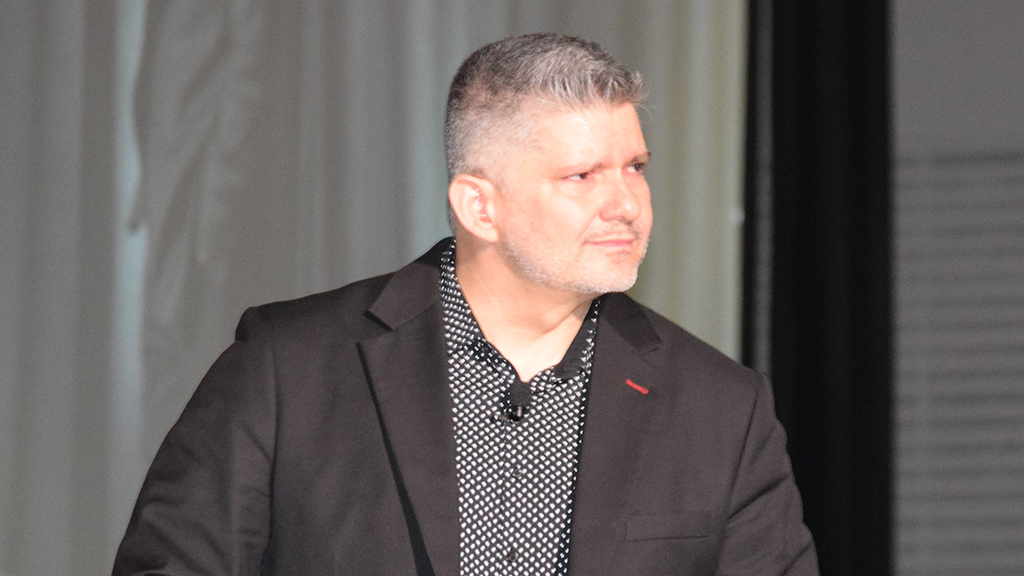Influential planner Brent Toderian told delegates attending the recent Ontario Professional Planners Institute (OPPI) conference in Hamilton he had been asked to inspire them but before long he found himself wagging his finger at them.
Toderian is a global consultant on city planning with clients in Norway, Australia, Columbia and elsewhere, with specialties in advanced urbanism and city hall change management. He founded Toderian UrbanWorks in 2012 after serving as chief planner for Vancouver and in senior positions in Calgary and Ontario.
Toderian was a keynote speaker at the OPPI conference Sept. 25. He said he felt comfortable speaking candidly to Ontario planners since he was active in the OPPI 25 years ago and considers Hamilton one of his hometowns.
The inspiration, it turns out, would follow blunt analysis.
“I can be extremely constructively critical about how much our profession needs to change, but that’s a tough needle to thread, to be critical of a profession at a time when, frankly, our profession is getting beat up more than any other time in my career,” said Toderian.
“It’s very tough to be a planner…We are getting attacked, and the concept of planning is getting attacked more than it ever has been.”
Ontario is a more difficult place for a planner to work than elsewhere because “Ontario does not have the best planning system,” said Toderian, referring to overuse of the Ontario Land Tribunal, formerly the Local Planning Appeal Tribunal, formerly the Ontario Municipal Board.
There are too many lawyers and the work is too adversarial, he said — problems that pre-dated the 2018 election of Doug Ford and his criticism of the “war on the car.”
‘Urgency,’ now ‘crisis’
Young planners were once taught to be patient, but as tensions rose, there was an attitude of “strategic impatience,” then “urgency,” and now “crisis.”
“That is the appropriate word for us to be using when we’re talking about what we’re doing on a daily basis,” said Toderian, the founding president of the Council for Canadian Urbanism.
Planners are at the forefront in dealing with five global crises in global cities, Toderian said: climate, housing, inequality, public health and infrastructure costs.
His practice has included years advising the Heart Foundation of Australia — he was asked to convince five Australian cities and five Australian states to do better planning for health particularly, he said, a consulting gig he never stops marvelling at.
“The public health crisis around the explosive epidemics of preventional diseases slide directly to how we plan, how we have led our cities and particularly our suburbs for decades, essentially causing health problems and health crises,” said Toderian.
Among other ills, Toderian said, cities need to fix the “density problem.” Many municipal politicians view density as a bad thing.
Multiple reforms are needed and planners are in the prime profession to influence the transformation of not only city planning but also mobility, access, streets, parking, budgets, Toderian said. But there has to be a major shift in attitude, he said.
‘Brent, calm down’
“When I was here in the 1990s I had senior representatives of our profession here in Ontario say to me, ‘Brent, calm down. You’re not an advocate. You’re supposed to be neutral,’” Toderian recalled.
“We are not neutral. Good planning is not neutral, and it needs champions. It needs advocates.”
And it means shedding the stereotype that planners are boring, Toderian said.
“Here in Ontario, I was taught, don’t speak that way…It’s unprofessional,” he said.
“It’s not true. We should be fundamentally transforming the way we communicate…Frankly, if anyone’s going to pay attention to us, including the media, which we are entirely too afraid of, then we have to be much more interesting. We have to break through the noise. We have to be at least as interesting as the people we’re fighting…or else we’re going to keep losing.”
The conference would no doubt serve to energize the delegates, he suggested, but too often the inspiration soon fades.
“We do need that transforming your work after the conference, not just for a little while, but forever.”
Follow the author on X/Twitter @DonWall_DCN.











Recent Comments
comments for this post are closed